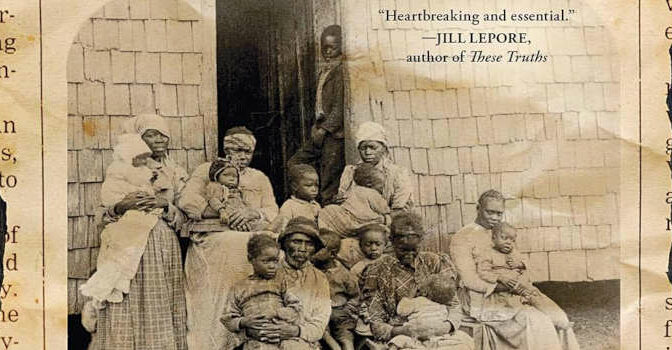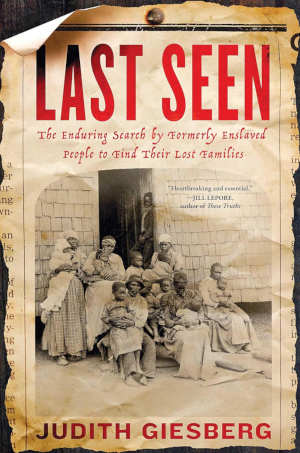Judith Giesberg Last Seen recensie, review en informatie boek van de Amerikaanse historicus over de voortdurende zoektocht van voorheen tot slaaf gemaakte mensen om hun verloren familie te vinden. Op 3 februari 2025 verschijnt bij Simon & Schuster het boek van Judith Giesberg over de zoektocht naar de verloren families van Amerikaanse tot slaaf gemaakten. Hier lees je informatie over de inhoud van het geschiedenisboek, de auteur en over de uitgave.
Judith Giesberg Last Seen recensie, review en informatie
- “Heartbreaking, and essential.” (Jill Lepore, Amerikaanse historicus en schrijfster)
- “This unvarnished account reminds us that centuries of suffering have yet to be fully acknowledged or atoned for. Informative and sobering.” (Kirkus Reviews)
- “Love speaks across miles, decades and centuries in this meticulously excavated tribute to the formerly enslaved mothers, fathers, siblings, and kin who published “last seen” advertisements in search of loved ones stolen from them in bondage. Patience and Clara Bashop, Hagar Outlaw, Tally Miller, and the other seekers featured here may or may not have succeeded in having their beloveds restored to them, but the power of their loving, the spirit of their loved ones, and the immense scope of their courage breathe off the page in this vital work of recovery.” (Ilyon Woo, author of Master, Slave, Husband, Wife)
Last Seen
The Enduring Search by Formerly Enslaved People to Find Their Lost Families
- Auteur: Judith Giesberg (Verenigde Staten)
- Soort boek: Amerikaanse geschiedenis, slavernijgeschiedenis
- Taal: Engels
- Uitgever: Simon & Schuster
- Verschijnt: 4 februari 2025
- Omvang: 336 pagina’s
- Uitgave: gebonden boek / ebook / luisterboek
- Prijs: $ 29,99 / $ 14,99 / $ 25,99
- Boek bestellen bij: Amazon / Bol / Libris
Flaptekst van het boek over de zoektocht van voorheen tot slaaf gemaakte mensen naar hun verloren familie
Drawing from an archive of nearly five thousand letters and advertisements, the riveting, dramatic story of formerly enslaved people who spent years searching for family members stolen away during slavery.
Of all the many horrors of slavery, the cruelest was the separation of families in slave auctions. Spouses and siblings were sold away from one other. Young children were separated from their mothers. Fathers were sent down river and never saw their families again.
As soon as slavery ended in 1865, family members began to search for one another, in some cases persisting until as late as the 1920s. They took out “information wanted” advertisements in newspapers and sent letters to the editor. Pastors in churches across the country read these advertisements from the pulpit, expanding the search to those who had never learned to read or who did not have access to newspapers. These documents demonstrate that even as most white Americans—and even some younger Black Americans, too—wanted to put slavery in the past, many former slaves, members of the “Freedom Generation,” continued for years, and even decades, to search for one another. These letters and advertisements are testaments to formerly enslaved people’s enduring love for the families they lost in slavery, yet they spent many years buried in the storage of local historical societies or on microfilm reels that time forgot.
Judith Giesberg draws on the archive that she founded—containing almost five thousand letters and advertisements placed by members of the Freedom Generation—to compile these stories in a narrative form for the first time. Her in-depth research turned up additional information about the writers, their families, and their enslavers. With this critical context, she recounts the moving stories of the people who placed the advertisements, the loved ones they tried to find, and the outcome of their quests to reunite.
This story underscores the cruelest horror of slavery—the forced breakup of families—and the resilience and determination of the formerly enslaved. Thoughtful, heart-wrenching, and illuminating, Last Seen finally gives this lesser-known aspect of slavery the attention it deserves.
Judith Giesberg was born 11 June 1966 in Texas. She is professor of history and Robert M. Birmingham chair in the humanities at Villanova University. She is the founder and director of the Last Seen archive, and the author of several books on Civil War history, including Army at Home, Emilie Davis’s Civil War, and Last Seen.

